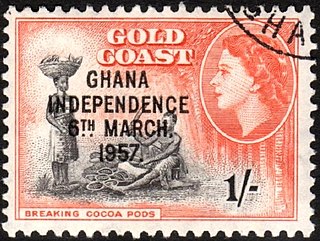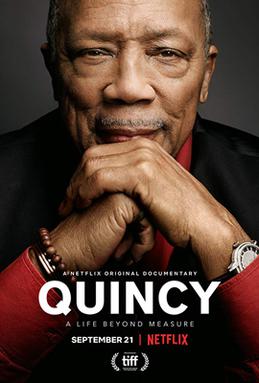Related Research Articles

The Vancouver International Film Festival (VIFF) is an annual film festival held in Vancouver, British Columbia, Canada, for two weeks in late September and early October.
Kwaku Dua Panin was the eighth Asantehene of the Ashanti Empire from 25 August 1834 until his death.

Cinema of Africa covers both the history and present of the making or screening of films on the African continent, and also refers to the persons involved in this form of audiovisual culture. It dates back to the early 20th century, when film reels were the primary cinematic technology in use. During the colonial era, African life was shown only by the work of white, colonial, Western filmmakers, who depicted Africans in a negative fashion, as exotic "others". As there are more than 50 countries with audiovisual traditions, there is no one single 'African cinema'. Both historically and culturally, there are major regional differences between North African and sub-Saharan cinemas, and between the cinemas of different countries.

Kwaw Paintsil Ansah is a Ghanaian film-maker, whose work as writer, director or producer includes Love Brewed in the African Pot in 1980 and Heritage Africa in 1989. His first feature, Love Brewed in the African Pot, earned immediate popular and critical acclaim throughout English-speaking Africa. Despite all the awards and the success, it would be nearly 10 years before Ansah could complete his next major film project, the ambitious Heritage Africa (1989). Yet again, the film was widely acclaimed and awarded. Since then, Ansah has produced other films, including Harvest at 17 (1994), Crossroads of People, Crossroads of Trade (1994) and The Golden Stool, the Soul of the Asantes (2000). Ansah is a crusader for African filmmaking and dramatic art, working ceaselessly for improved funding and distribution of African films within Africa. He has been chairman of FEPACI and a leader in the direction of FESPACO. In 1998, Ansah was awarded the Acrag Prize, the Living Legend Award for Contribution to the Arts of Ghana.

Ghana gained independence from the British on 6 March 1957. It is a member of the Commonwealth of Nations. The country became a republic on July 1, 1960.
Akwasi or Kwasí or Kwesi is an Ashanti masculine given name originating from the Ashanti people and their Ashanti day naming system, meaning born on a Sunday. People born on particular days are supposed to exhibit the characteristics or attributes and philosophy, associated with the days. Akwasi has the appellation Bodua or Obueakwan meaning agility. Thus, males named Akwasi are supposed to be agile by nature.
Love Brewed in the African Pot is a 1980 Ghanaian romantic drama film directed by Kwaw Ansah. It was reportedly the first privately financed Ghanaian feature film and is considered a classic.
The Ghana Academy of Film and Television Arts (GAFTA) is a private, professional organization dedicated to the advancement of excellence in the art, craft and science of the motion picture industry — film, television and new media. The Academy is made up of the following guilds and associations: Directors Guild of Ghana (DGG), Cinematographers Guild of Ghana (CGG), Art Directors' and Designers' Guild of Ghana (ADGG), Animator's Association of Ghana (AAG), Screen Writers Guild of Ghana (SWGG), Film and Television Production Facilitators Guild of Ghana (FTPFGG), Producers Guild of Ghana (PGG), Motion Picture Sound Guild of Ghana (MPSGG) and Screen Editors Guild of Ghana (SEGG).
Christian Tsui Hesse, popularly known as Chris Hesse is a Ghanaian cinematographer, filmmaker, film administrator, photographer and Presbyterian minister who is known for his cinematography in several award-winning films such as the critically acclaimed Love Brewed in the African Pot (1980) and Heritage Africa (1989). He was the personal photographer of Ghana's first President, Dr Kwame Nkrumah. Chris Hesse helped to document the visual history of the political leadership and development of the country. He also worked for the United Nations, serving as a photographer, documenting the Congo crisis in 1960.

Nana Oforiatta Ayim is a Ghanaian writer, art historian and filmmaker.

Cinema of Ghana also known as the Ghana Film Industry nicknamed Ghallywood, began when early film making was first introduced to the British colony of Gold Coast in 1923. At the time only affluent people could see the films, especially the colonial master of Gold Coast. In the 1950s, film making in Ghana began to increase. Cinemas were the primary venue for watching films until home video became more popular. The movie industry has no official name as yet since consultations and engagements with stakeholders has been ongoing when a petition was sent to the Ministry of Tourism, Arts and Culture which suspended the use of the name Black Star Films.

Quincy is a 2018 American documentary film about the life of American record producer, singer and film producer Quincy Jones. The film was co-written and co-directed by Alan Hicks and Rashida Jones and produced by Paula DuPré Pesmen. The film was released by Netflix on September 21, 2018.

Felicia Ewuraesi Abban was Ghana's first female professional photographer. She worked as a photographer for the country's first president, Kwame Nkrumah, for a number of years during the 1960s.

The Good Old Days: The Love of AA is a 2010 Ghanaian romance film which tells a story about two friends who fell in love with each other from their days of Senior High School. It was directed by Kwaw Ansah and released in 2010.
Cinema of Sudan refers to both the history and present of the making or screening of films in cinemas or film festivals, as well as to the persons involved in this form of audiovisual culture of the Sudan and its history from the late nineteenth century onwards. It began with cinematography during the British colonial presence in 1897 and developed along with advances in film technology during the twentieth century.

Jean-Marie Teno is a Cameroonian film director and filmmaker, "one of Africa's most prolific filmmakers". His films address censorship, human rights violations, globalization, and the effects of colonialism. Teno has made films in many different forms but favors making documentaries. In an interview when asked about his favor style of film to make he responded, "documentary because when you do fiction, people think it's not true. When it's the documentary, they are embarrassed, embarrassed".
Mensa Ansah, better known as M3NSA is a British Ghanaian producer, composer, rapper, singer and filmmaker. Known for his recognizable sound and instinctual storytelling, while still being deeply rooted in his motherland, he has grown into an international sensation through the years because of his ability to navigate different languages, cultures, and art expressions.
Evans Nii Oma Hunter was a Ghanaian veteran actor, producer, director and writer who contributed to the growth of the local movie and theater industry.
References
- ↑ "Critical Analysis: Kwaw Ansah – Heritage Africa". DANDANO. 2016-06-15. Retrieved 2019-10-11.
- ↑ "Heritage Africa". African Film Festival, Inc. 2012-06-21. Retrieved 2019-10-11.
- ↑ Heritage Africa , retrieved 2019-10-11
- ↑ Heritage Africa , retrieved 2021-08-12
- ↑ Weaver, Hal (March 1989). "Vues d'Afrique: The new African Cinema in Canada". Cinema Canada. p. 22.